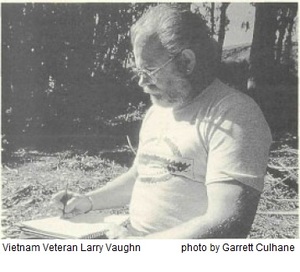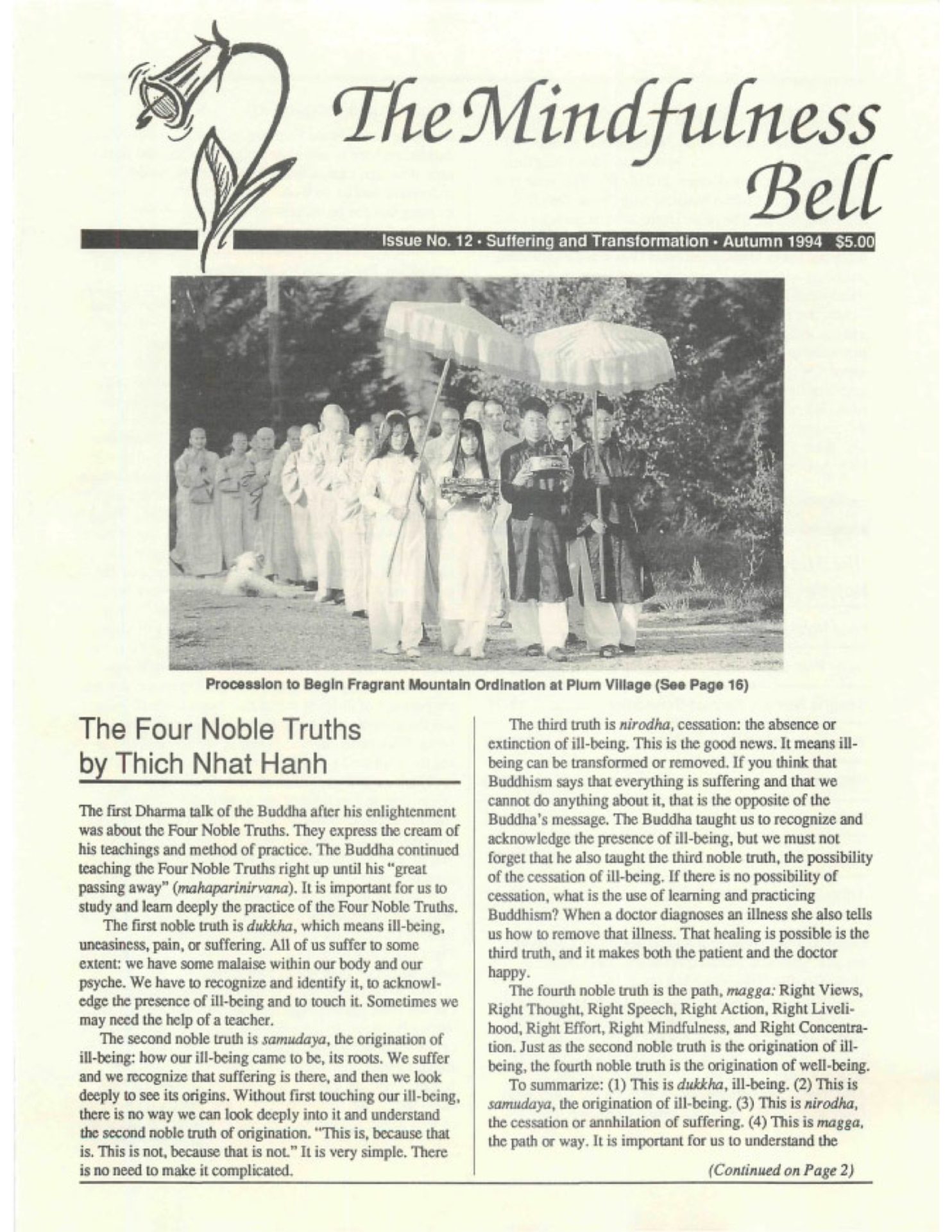By Michael Gardner & Therese Fitzgerald
The group of veterans gathered casually on the deck near the familiar round yurt in the bright May morning sunshine. They spoke quietly as they gazed out at the tall grass and wildflowers in the surrounding fields of Green Gulch Farm. This was the ninth meeting at which men and women who have experienced the horrors of war joined with Maxine Hong Kingston to find support and healing through writing. At 9:30 a.m.
By Michael Gardner & Therese Fitzgerald
The group of veterans gathered casually on the deck near the familiar round yurt in the bright May morning sunshine. They spoke quietly as they gazed out at the tall grass and wildflowers in the surrounding fields of Green Gulch Farm. This was the ninth meeting at which men and women who have experienced the horrors of war joined with Maxine Hong Kingston to find support and healing through writing. At 9:30 a.m. the group moved indoors to begin a day of writing and sharing. A warm spring breeze and an open door provided fresh air and a relaxed atmosphere. Two swallows created a brief distraction when they flew inside and circled like observing angels, then exited just as gracefully.
After the group sitting meditation, Maxine suggested, "Pick a scene from life of two people connecting. How is the connection made? What are the feelings? What do they say? Be sure they talk to one another. Dialogue is very difficult because you have to listen to the other voice. Listen carefully and let the characters speak to you. Limit the number of people in your scene to two. A third element will distract you from the interaction of the two main characters. You want your interaction to be focused. There are different points of view you can take as the author. You can choose to write as one of the people or as an omniscient observer. The omniscient point of view reports what is happening to both people without identifying with either."
The group was joined in the afternoon by Ron Kovic, Vietnam veteran and author of Born on the Fourth of July. Maxine asked Ron if he would speak to us and he obliged, sharing humbly and passionately of his life as a writer and veteran. Some of his encouraging words are recorded here: "Lewis Puller, Vietnam veteran leader, took his own life last June. I met Lewis in Washington, D.C., when I joined Veterans Against the War. I was introduced to him and never forgot him. He was more severely wounded than any survivor I had met. 1 could feel that emptiness in him. He wasn't as angry as I was. Something had been knocked out of him. I thought about my own suicidal feelings as recently as six years ago. I do have a strong faith again and belief in life. I know how important it is to keep living. I don't know if we ever heal completely from that war, but if we continue to communicate our feelings, that is the important thing. When I was at the worst of my torments, I decided life was worth living. I think there is redemption, even in the simple things we do in our lives.
"I never graduated from college and I can't spell, but I've always had a terrific drive. My book was reviewed on the front page of the New York Times. My parents were more shocked by my success than I was. The New York Times review came out August 15,1976.1 rushed down and bought all the papers in the store. My mother couldn't believe it. I had joined the Marines to make up for my academic failure and gone on two tours in Vietnam.

"I wrote on a manual typewriter I'd bought for $40 and worked all night. When the black ink ran out, I switched to red. When the red ink ran out, I just typed impressions on the paper. I wrote top to bottom on the whole page, without paragraphs, and when it was full, I flipped the paper over and filled the other side. I wrote with fury. I didn't want to admit I did not want to live. This was my final confession, my last will and testament, and I was afraid I was going to die before it was finished. We are here to leave something beautiful behind. We are here to struggle and fight to create something. Have faith that you will leave something special. You never know what wonderful things are out there waiting for you. The most valuable letters I received were from people who decided to keep on living after reading my book. There were less than ten of these, but they are the most precious. I put the manuscript in a box and my buddy came with me to New York. I was lucky enough to sell it to McGraw Hill in less than a week. Then I got to cowrite the screenplay with Oliver Stone.
"I want to inspire you. Try to find patrons and supporters who love your work. Be careful who you read to. Choose your supporters carefully. Make sure they really love you. Constructive criticism can be deadly to your morale."
The participants shared their appreciation with Ron for calling attention to the problems that afflict so many Vietnam veterans. Ron stayed through the afternoon and listened as the others read what they had written that morning. There was great mutual respect and support in the room. We each felt deeply touched by the truths that were shared in the reading and those that were shared in the silence.
In August, we met in the home of a friend in rural Sebastopol. Maxine spoke to us about creating a setting for ourselves to use in writing. "I always begin a writing day with meditation. I don't turn on the TV or radio or even talk to anyone. The silence helps me hear voices from within. The muses speak clearest when my mind is uncluttered and close to the previous night's dreams. But after a few weeks of working alone, I need group energy to strengthen me. We get inspiration from each other. This takes strength and bravery because sometimes it hurts to bring others into our lives. "After losing everything in the Oakland Hills Fire, I found I had filled out 100 pages of insurance forms and only a few pages of my novel. I had to list each item. So I decided to use the insurance form to mourn every item. This way even seemingly routine writing served in my healing from the fire. We have many wars in life, and we can use writing to help us heal from all of them."
After this talk we had a long silent period to write about a happy scene in our lives. The afternoon readings were filled with playful, inspired moments that many of us had thought we had forgotten. The muses were speaking to us very clearly.
The October retreat/writing workshop at Omega Institute was a rarer opportunity for veterans on the East Coast who do not meet monthly. We began a day earlier than the rest of the retreatants, and there was a strong feeling of camaraderie among the veterans who had gathered twice before with Thay and once with Maxine. The transformation was tangible and greatly helped the newcomers setde in. We had quiet to get to know ourselves and practice meditation indoors and outdoors in the gorgeous autumn weather.
Maxine encouraged us to "reclaim our bodies, take our ways of walking and eating back, reclaim our senses, and bring all this to our writing, trusting the words as a medium to return home step by step." After a period of writing—for some veterans, the first time since the war—people read: Bill about "schlepping around in the mud and the fear," giving thanks to the nine fellow soldiers he killed by "friendly fire" who allowed him to reclaim his spirit—"laying my soul on the table—now it's mine." Jerry wrote of the power of the woman warrior—"Is the shimmering of the water your voice?" Bill revealed how war "made me feel like a frightened animal, so that only with prostitutes did I feel human; only during war is such madness 'normal.'" Jim revealed his insight in response to his similar experience: "I thought I was in heaven. Then ten years later, I realized it was my sister lying there." Claude: "I am not a wound: I'm wounded and I'm healing." George dug down deep and read about "cutting off your senses; no mourning, no feelings—that's the unwritten law of war: 'just move on.' We have to embrace the pain to transform it." George wrote about "fellows who covered me with their bodies to stop me from bleeding and died," and forging a vow "to thank them by living a good life."
Powerful work alone and with others in the circle of veterans was done before they presented their stories to the other 150 retreatants Saturday evening. "You could feel the deep listening in the room as soon as the bell rang," Dan commented later. This deep listening—the listening of the veterans to their own and each other's stories, and that of the non-veterans to those who were closest to the heat of the war—offered deep healing to wounds so long endured.
Therese Fitzgerald and Michael Gardner are Director and Assistant Director of the Community of Mindful Living.

